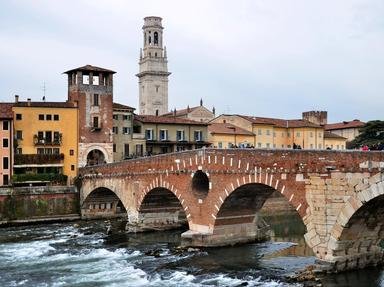Quiz Answer Key and Fun Facts
1. What are the names of the two eponymous "Gentlemen of Verona"?
2. Which one of these animals appears on stage as part of the action of "The Two Gentlemen of Verona"?
3. Why does Proteus not wish to follow his adventurous friend Valentine to Milan, to see the world as his father wishes him to do?
4. Once in Milan, the impressionable young Valentine immediately falls madly in love with a lady called Silvia - the Duke of Milan's daughter, no less. With what felicitous phrase, perhaps inspired in part by Shakespeare's reading of Ovid, does Valentine's quick-witted page Speed mock his master's new existential condition?
5. Locked in a tower by her father to keep unwelcome lovers away from her, Silvia is powerless to escape until Valentine comes up with a cunning plan. How does he intend to rescue Silvia from her prison so that they can elope together?
6. Back in Verona, what does Julia decide to do after Proteus has left her?
7. What is the outcome of Valentine's chance meeting with a band of outlaws in the forest near Mantua?
8. Who composed the original music to the beautiful lyric "Who is Silvia?", which is sung beneath its dedicatee's window at night, after Valentine's banishment, with Proteus and Thurio in attendance?
9. Silva finally escapes from her prison into the forest with the help of her chivalrously-named friend Eglamour - who, rather unchivalrously, runs away when attacked by outlaws and allows her to be captured. Proteus, however, being conveniently in the vicinity, promptly rescues her. How does Proteus behave after rescuing Silvia from the outlaws?
10. Which one of these things has Shakespeare *not* often been criticised for in "The Two Gentlemen of Verona"?
Source: Author
londoneye98
This quiz was reviewed by FunTrivia editor
looney_tunes before going online.
Any errors found in FunTrivia content are routinely corrected through our feedback system.
